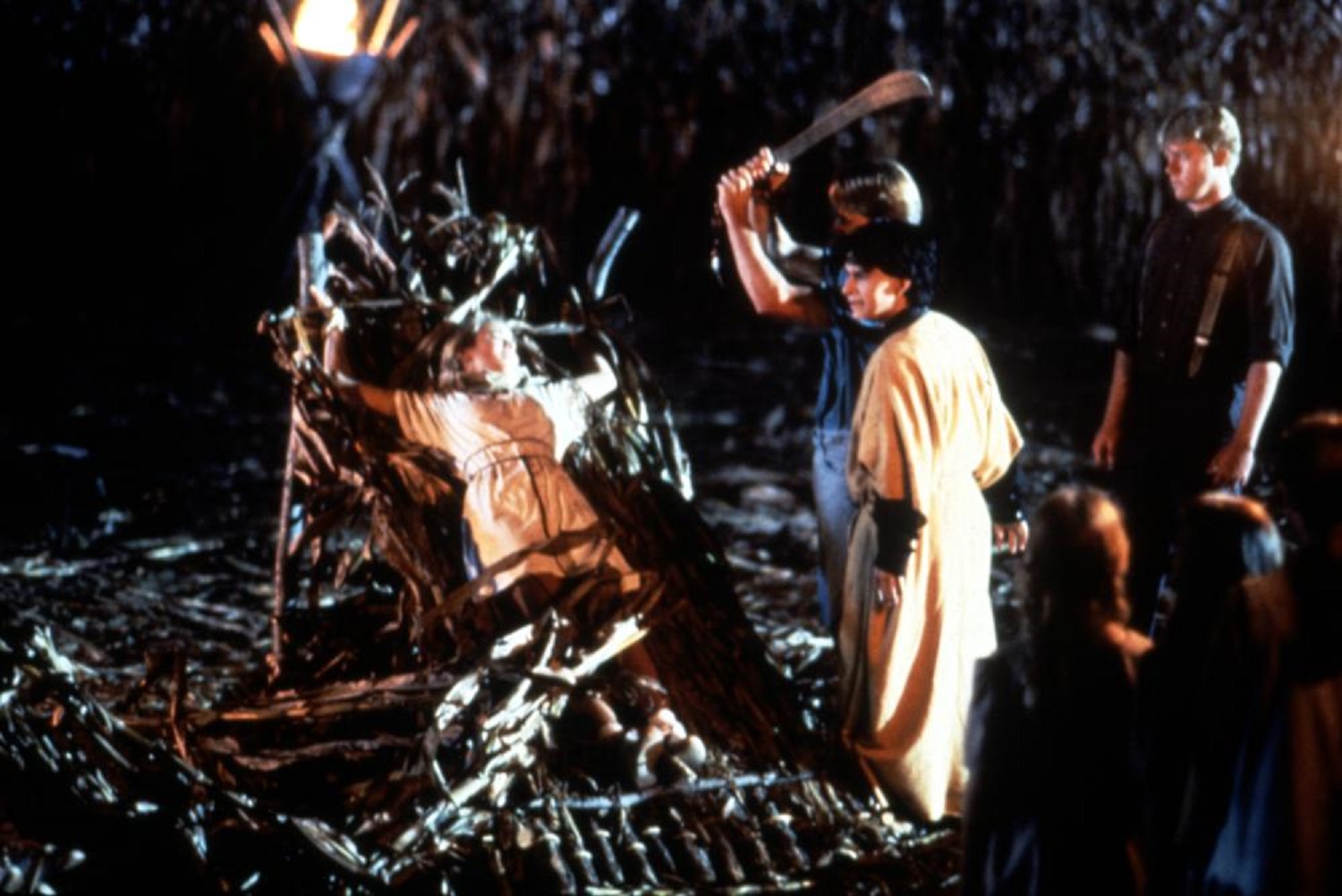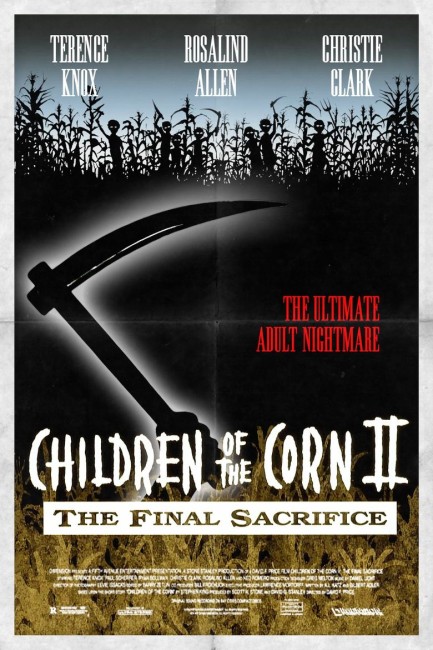aka Children of the Corn II: Deadly Harvest
Crew
Director – David F. Price, Screenplay – Gilbert Adler & A.L. Katz, Producers – David G. Stanley & Scott A. Stone, Photography – Levie Isaacks, Music – Daniel Licht, Visual Effects – Calico Ltd, Mechanical Effects Supervisor – Ray Bivins, Makeup Effects – Image Animation (Supervisor – Bob Keen), Production Design – Greg Melton. Production Company – Fifth Avenue Entertainment.
Cast
Terence Knox (John Garrett), Paul Scherrer (Danny Garrett), Ryan Bollman (Micah), Christie Clark (Lacey), Ned Romero (Professor Red Bear), Rosalind Allen (Angela), Wallace Merck (Sheriff Blaine), Marty Terry (Mrs Burke/Mrs West), Ed Grady (Dr Appleby)
Plot
John Garrett, a journalist with the World Enquirer, arrives in Herringfort, Nebraska to write an article about the murders in the neighbouring town of Gatlin. Garrett meets Native American comparative anthropology professor Red Bear who shows him some Indian drawings that tell of a spirit that raises the children and turns them against their parents when the adults pollute the land. They also find that the people of Herringfort have been hiding a brand of toxic corn, the dust from which blew into Gatlin, causing madness in the children. Meanwhile, the forces in the cornfield possess Micah, one of the Gatlin children, and appoint him the leader of a new cult. He starts recruiting other children and then bloodily killing the Herringfort locals. At the same time, in an attempt to seduce him over to their side, the new cult starts preying upon Garrett’s estranged teenage son Danny as he argues with his father.
Aside from William Shakespeare, Stephen King must hold some sort of record not only as the author with not just the greatest number of films adapted from his works – more than 50 films and works for tv – but surely for the greatest number of works adapted from the slimmest source – his short story The Lawnmower Man (1975) has inspired two films, The Mangler (1972) three films and Children of the Corn (1977) at about 18 pages has inspired ten films (see below for the other titles). The number of Children of the Corn adaptations is amazing considering the fact that almost all Stephen King fans hold the first Children of the Corn (1984) film as arguably the worst of all film made from his works.
The good thing about Children of the Corn II is that it is a better film that its predecessor. Children of the Corn failed to expand upon Stephen King’s story, which was essentially only a lead up to a twist ending. Children of the Corn II‘s success lies in taking the basic premise of the first film and conducting it along the formula lines of the modern horror film – which essentially means having someone killed every few minutes – and is something that works immeasurably for the film.
Some of these killings are rather entertaining – the old lady being squashed under the house – while others verge on the campy – the old lady being thrown through a window by a truck as someone calls Bingo numbers, the moment where the children place lollipops in the doctor’s mouth after killing him. Certainly, the sequel never amounts to anything more than a vehicle for producing killings at what seem to be timed intervals. It at least aspires to be an entertainingly mediocre, as opposed to the first film, which was only dull.

The other area the film improves over the original is in terms of explaining what is going on. Stephen King’s short story hinged upon a surprise ending, which meant that it never had to explain what was happening – but in changing it for a more upbeat ending, the first film failed to see that and came across as slim and underdeveloped. The sequel compensates, in fact over-compensates, offering up two different and mutually contradictory explanations – one involving Native American spirits who cause the children to rise up against the adults when the land is despoiled, and the second involving madness-causing toxic corn. In the end, neither idea quite jells, although the ending perhaps by after-thought appears to go with the supernatural angle – but the film at least appears to have fun tossing such ideas about. The script also appears to offer more substantial treatment of its themes – playing up the conflict between the estranged father and son. (In a nice moment of irony, the father engages in exactly the same sins he condemns the son for, which makes the son perfect pickings for the children). A much better film would have made this character conflict the centre of the story.
Many of the performances leave much to be desired. Terence Knox makes for a dull hero. Knox is not what one would call an intellectual performer. He always has this sweaty, untrustworthy intensity, as though he is a secret wife-beater or some such. The only part to ever exploit this to advantage was his role as the rapist doctor on tv’s St Elsewhere (1982-8) and everything else he has been in makes him seem like a truck driver, a heavy or slightly slow on the uptake. Rosalind Allen is bland and almost entirely colourless. Ryan Bollman overacts the children’s leader part – his only acting mode appears to be to deliver his lines entirely as a yell. Christie Clark is the film’s one find, giving a bright, natural and sparkling performance that leaves one looking forward to seeing more from her.
The subsequent Children of the Corn films were:– Children of the Corn III: Urban Harvest (1995), Children of the Corn: The Gathering (1996), Children of the Corn V: Fields of Terror (1998), Children of the Corn 666: Isaac’s Return (1999), Children of the Corn: Revelation (2001), Children of the Corn: Genesis (2011) and Children of the Corn: Runaway (2018). Children of the Corn (2009) was a superior remake of the original, while Children of the Corn (2020) tells an origin story.
Director David F. Price also made the genre likes of Son of Darkness: To Die For II (1991) and the comedy Dr. Jekyll and Ms. Hyde (1995), while he also produced Leprechaun (1993).


